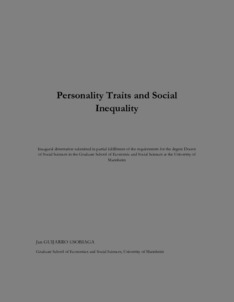|
Personality traits and social inequality
Guijarro Usobiaga, Jan
![[img]](https://madoc.bib.uni-mannheim.de/style/images/fileicons/application_pdf.png)  Vorschau |
|
PDF (Dissertation Jan Guijarro Usobiaga)
DISSERTATION_JAN_GUIJARRO_USOBIAGA_FINALE_FORMATIERUNG_20150526.pdf
- Veröffentlichte Version
Download (1MB)
|
|
URL:
|
https://madoc.bib.uni-mannheim.de/38884
|
|
URN:
|
urn:nbn:de:bsz:180-madoc-388841
|
|
Dokumenttyp:
|
Dissertation
|
|
Erscheinungsjahr:
|
2015
|
|
Ort der Veröffentlichung:
|
Mannheim
|
|
Hochschule:
|
Universität Mannheim
|
|
Gutachter:
|
Hillmann, Henning
|
|
Datum der mündl. Prüfung:
|
7 Mai 2015
|
|
Sprache der Veröffentlichung:
|
Englisch
|
|
Einrichtung:
|
Außerfakultäre Einrichtungen > GESS - CDSS (SOWI)
Fakultät für Sozialwissenschaften > Economic and Organizational Sociology (Hillmann 2009-)
|
|
Fachgebiet:
|
300 Sozialwissenschaften, Soziologie, Anthropologie
|
|
Fachklassifikation:
|
THES_SOZ:
|
|
Normierte Schlagwörter (SWD):
|
Persönlichkeitsfaktor , Arbeitslosigkeit , Mobilität , Transmission
|
|
Freie Schlagwörter (Englisch):
|
personality traits , unemployment , job mobility , transmission
|
|
Abstract:
|
During many decades, sociologists have downplayed the role that personality traits play in shaping individual’s lives. However, recent studies, mostly in economics, have shown the influence of these traits on a several educational and occupational outcomes. This thesis is an attempt to shed more light on this topic. By using longitudinal data from the German Socio-Economic Panel, it first investigates how the Big Five personality traits affect two important labor market outcomes: unemployment incidence and job mobility. The results from these first two articles show two things. First, personality traits contribute importantly to processes of job mobility and job loss. Second, models including personality traits fit better compare to models that exclude them. Additionally, the inclusion of personality traits also improves our understanding of the underlying process in the labor market.
The second part of this thesis focuses on how personality traits are transmitted from parents to their children. My results show that socialization processes are extremely important in the transmission and development of personality traits. Higher educated parents are more successful in promoting socially desirable and success-enhancing traits than lower educated ones. While there is a direct influence of the parent’s education on the development of children’s personality traits, the effect is mediated by different childrearing practices and by the use of external daycare.
|
|
Übersetzter Titel:
|
Persönlichkeitsmerkmale und soziale Ungleichheit
(Deutsch)
|
 | Dieser Eintrag ist Teil der Universitätsbibliographie. |
 | Das Dokument wird vom Publikationsserver der Universitätsbibliothek Mannheim bereitgestellt. |
 Suche Autoren in Suche Autoren in
Sie haben einen Fehler gefunden? Teilen Sie uns Ihren Korrekturwunsch bitte hier mit: E-Mail
Actions (login required)
 |
Eintrag anzeigen |
|
|
